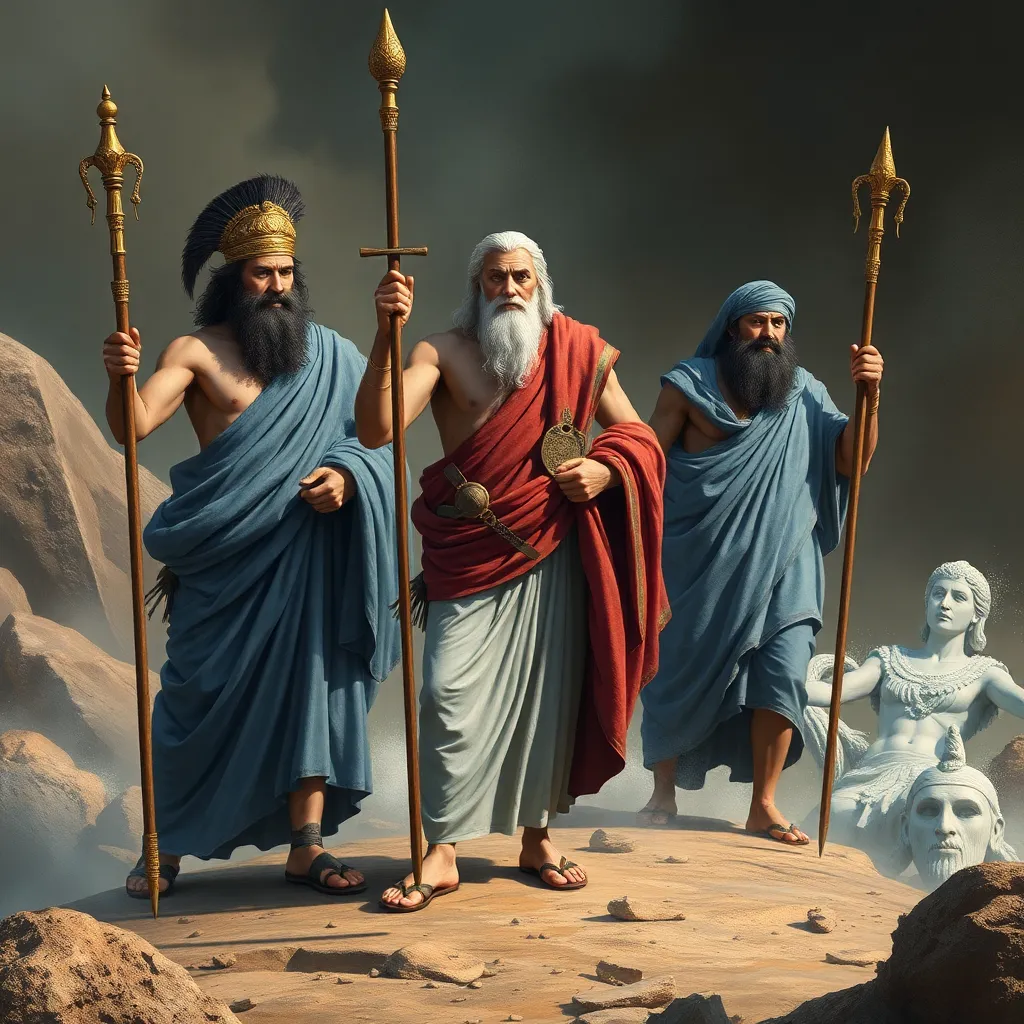The Significance of Odysseus’ Companions in The Odyssey
I. Introduction
The Odyssey, attributed to the ancient Greek poet Homer, stands as one of the most significant works in Western literature. It recounts the epic journey of Odysseus as he attempts to return home to Ithaca after the Trojan War. Throughout this perilous voyage, Odysseus is accompanied by a diverse group of companions whose actions and decisions significantly shape the narrative.
The importance of Odysseus’ companions cannot be overstated. They serve not only as aids in his journey but also as reflections of his character and the challenges of the human experience. This article explores the various roles his companions play, highlighting themes of loyalty, leadership, and the complexities of the human condition.
II. The Role of Companions in Greek Heroic Tradition
In epic literature, companionship is a vital component that underscores the heroic journey. Companions often serve as both allies and foils to the hero, enriching the narrative and providing depth to the hero’s character.
When compared to other epic tales, such as The Iliad, the role of companions becomes evident. In The Iliad, the bonds between warriors like Achilles and Patroclus illuminate themes of friendship and loyalty. Similarly, in The Odyssey, Odysseus’ companions are crucial in demonstrating the significance of camaraderie in the face of adversity.
- Companionship offers emotional support.
- It enhances the sense of shared destiny.
- It introduces conflict and contrast in character development.
III. Loyalty and Betrayal Among Odysseus’ Companions
The dynamics of loyalty and betrayal among Odysseus’ companions play a pivotal role in the narrative. Instances of loyalty are exemplified by characters like Eurylochus, who, despite moments of doubt, ultimately stands by Odysseus during trials. In contrast, the betrayal of the crew regarding the cattle of Helios serves as a grim reminder of the consequences of disobedience and greed.
Key examples include:
- Eurylochus vs. the loyal crew: Eurylochus frequently questions Odysseus’ decisions, yet when it counts, he remains with his leader.
- The cattle of Helios: The crew’s insatiable hunger leads them to slaughter the sacred cattle, resulting in divine retribution and their ultimate demise.
The impact of these actions profoundly affects Odysseus’ journey, emphasizing that loyalty can lead to survival, while betrayal results in dire consequences.
IV. Representations of Leadership and Authority
Odysseus epitomizes the qualities of a great leader, but his journey is fraught with challenges that test his authority. His strategic thinking, bravery, and resilience are often challenged by the desires and fears of his companions.
The influence of companions on Odysseus’ decisions is evident throughout the narrative. For instance, their fear and reluctance often sway him to reconsider his plans, showcasing the dynamics of power within the group.
- Odysseus as a leader: His ability to inspire loyalty and courage is crucial.
- Dynamics of power: The fluctuating authority among companions illustrates the complexities of leadership.
V. Symbolism of Companions in the Hero’s Journey
Odysseus’ companions serve as reflections of his character and the various aspects of humanity. Each companion embodies different traits, such as bravery, foolishness, loyalty, and treachery, which collectively enrich the narrative.
The significance of loss and survival is poignantly illustrated through the fates of these companions. As many fall victim to their own shortcomings, Odysseus is left to ponder the cost of his journey. This loss underscores the themes of sacrifice and the harsh realities of life.
- Reflections of Odysseus’ character: Companions mirror his strengths and flaws.
- Embodiment of humanity: They represent the full spectrum of human experience.
VI. The Role of Women in the Companionship Dynamic
Female figures such as Circe and Calypso play significant roles in the companionship dynamic within The Odyssey. These powerful women influence Odysseus and his crew, offering both temptations and trials that challenge their loyalty and resolve.
Circe, with her enchanting powers, initially poses a threat to Odysseus’ men, turning them into swine. However, her eventual assistance highlights the complex nature of female companionship in the epic. Similarly, Calypso’s love for Odysseus represents both a refuge and a hindrance, as she detains him on her island for years.
- Influence on Odysseus: These women shape his journey and decisions.
- Gender dynamics: Their interactions with Odysseus reflect broader themes of power and desire.
VII. The Consequences of Companionship on the Journey Home
The trials faced by Odysseus and his companions, such as their encounters with the Sirens and the Cyclops, reveal the complex interplay of individual choices and group dynamics. Each decision made by the companions has significant repercussions for the entire group.
Major trials include:
- The Sirens: The crew’s ability to resist temptation demonstrates the importance of unity and resolve.
- The Cyclops: Odysseus’ cunning leads to both the triumph and loss of several companions.
These experiences culminate in profound lessons learned, shaping the character and maturity of both Odysseus and his companions as they navigate the perilous journey home.
VIII. Conclusion
In summary, the companions of Odysseus in The Odyssey are not merely secondary characters; they are essential to the narrative’s structure and themes. Their loyalty, betrayals, and individual choices are instrumental in shaping Odysseus’ journey and experiences.
Reflecting on the enduring themes of loyalty, leadership, and the human condition, it becomes clear that the companions enrich the narrative, providing depth to the exploration of heroism in the epic. Ultimately, their presence invites readers to contemplate the complexities of the human experience and the bonds that define us.




